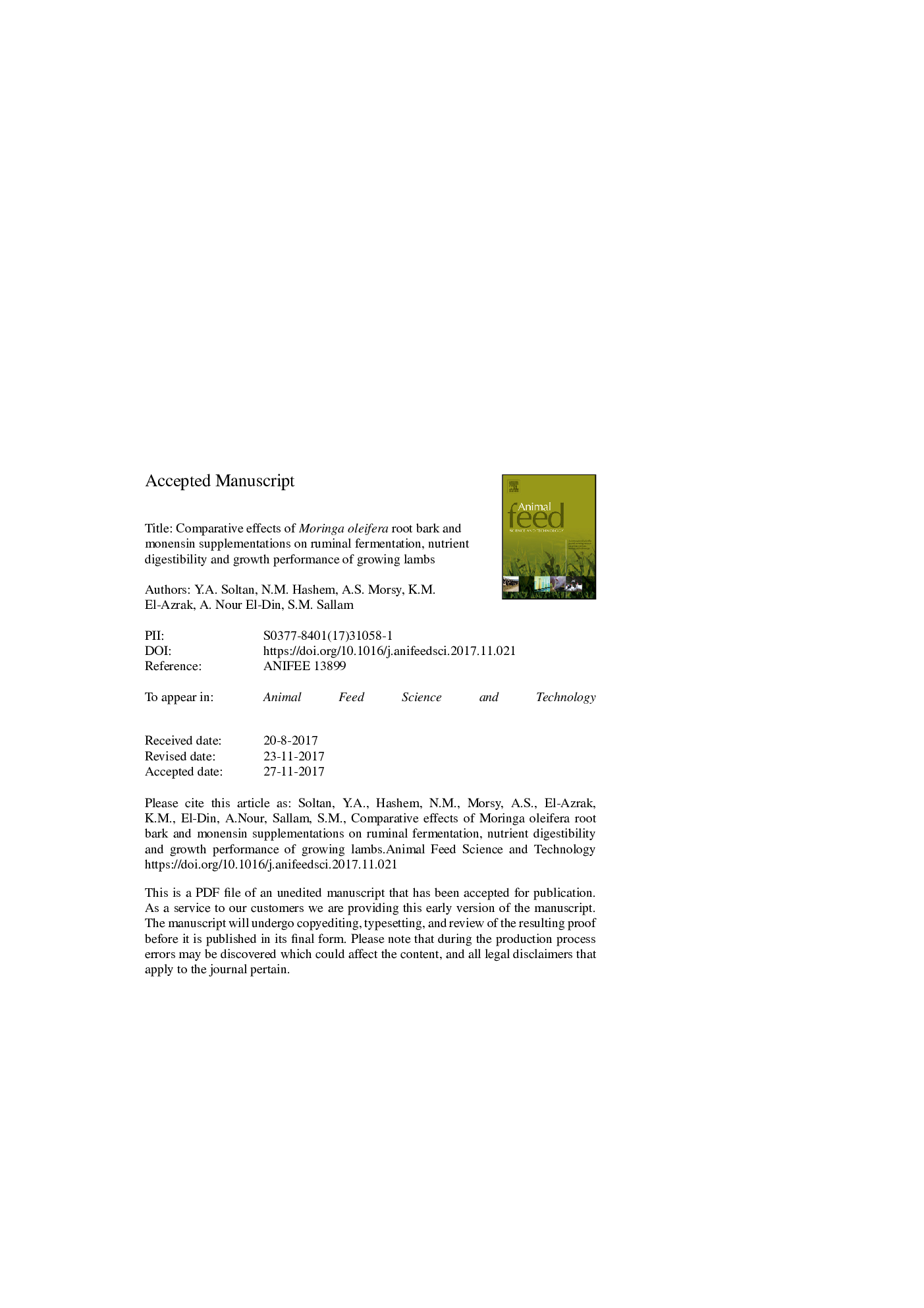| کد مقاله | کد نشریه | سال انتشار | مقاله انگلیسی | نسخه تمام متن |
|---|---|---|---|---|
| 8491067 | 1552351 | 2018 | 42 صفحه PDF | دانلود رایگان |
عنوان انگلیسی مقاله ISI
Comparative effects of Moringa oleifera root bark and monensin supplementations on ruminal fermentation, nutrient digestibility and growth performance of growing lambs
ترجمه فارسی عنوان
اثرات تطبیقی مکمل های ریشه کوهی مورینگا اولیفر و موننسین بر تخمیر شخم، قابلیت هضم غذا و عملکرد رشد بره های رشد
دانلود مقاله + سفارش ترجمه
دانلود مقاله ISI انگلیسی
رایگان برای ایرانیان
کلمات کلیدی
ADFomTDOMaNDFomDMIADGMRBSCFAsCH4AOACGC–MS - GC-MSActive components - اجزای فعالShort-chain fatty acids - اسیدهای چرب کوتاه مدتash-free acid detergent fibre - الیاف پاک کننده اسید اسید آزادassociation of official analytical chemists - انجمن متخصصان تحلیلی رسمیGas production - تولید گازgas chromatography–mass spectrometry - طیف سنجی جرم کروماتوگرافی گازGrowth performance - عملکرد رشدpartitioning factor - فاکتور پارتیشن بندیDigestibility - قابلیت هضمLignin (sa) - لیگنین (در)organic matter - ماده آلیdry matter - ماده خشکMethane - متان average daily gain - متوسط افزایش روزانهdry matter intake - مصرف ماده خشکbody weight - وزن بدنcrude protein - پروتئین خامIonophores - یونوفورس
موضوعات مرتبط
علوم زیستی و بیوفناوری
علوم کشاورزی و بیولوژیک
علوم دامی و جانورشناسی
چکیده انگلیسی
Two comparative in vitro and in vivo experiments were accomplished to assess the effects of Moringa oleifera root bark (MRB) and ionophore antibiotic monensin as dietary feed additives for ruminants' diets. In the in vitro experiment, the effects of graded levels of MRB (0, 25 and 50 g/kg DM) and monensin (40 mg/kg DM) on ruminal fermentation and degradability parameters were evaluated using the semi-automatic gas production (GP) system. Results were subjected to regression analysis (dose-response analysis) and ANOVA to select the MRB effective dose. In the in vivo experiment, eighteen Barki lambs (BW; 25 ± 3.1 kg) were randomly allotted into three dietary treatments (n = 6/treatment) as: control (basal diet without additive), monensin (40 mg/kg DM) and MRB (25 g/kg DM). The experiment lasted for 70 days to collect ruminal samples and evaluate lamb performance, while the subsequent 7 days were assigned for the nutrient digestibility and nitrogen balance trial. The GC-MS analysis of MRB showed that the most abundant phytochemicals were organosilicons, alkaloids and benzoic acid ester. Results of the in vitro assay showed that both MRB doses inhibited (P < 0.01) CH4 production (ml/g DM) without adverse effects on GP and degradability compared to control. Diet supplemented with 25 g MRB/kg DM resulted in the highest increase (P = 0.03) of propionate compared to control. Ammonia concentration was decreased (P < 0.01) by monensin, while protozoal counts were not affected by all experimental diets. The in vivo effects of MRB on ruminal fermentation profile were different from those of in vitro assay. MRB enhanced (P < 0.05) the total short chain fatty acids, acetate production and nutrients digestibility, while monensin enhanced propionate (P < 0.01) compared to other diets. Both monensin and MRB exhibited similar reductions (P < 0.01) in protozoal counts, urine N excretions and estimated CH4 produced per unit of body weight gain while enhanced (P < 0.05) the body N retention, average daily gain, and feed efficiency compared to control. These results suggested that, although MRB was less effective than monensin, it favourably modified the ruminal fermentation process and nutrients digestibility, thus it could be used as a novel dietary feed additive for ruminant diets.
ناشر
Database: Elsevier - ScienceDirect (ساینس دایرکت)
Journal: Animal Feed Science and Technology - Volume 235, January 2018, Pages 189-201
Journal: Animal Feed Science and Technology - Volume 235, January 2018, Pages 189-201
نویسندگان
Y.A. Soltan, N.M. Hashem, A.S. Morsy, K.M. El-Azrak, A. Nour El-Din, S.M. Sallam,
